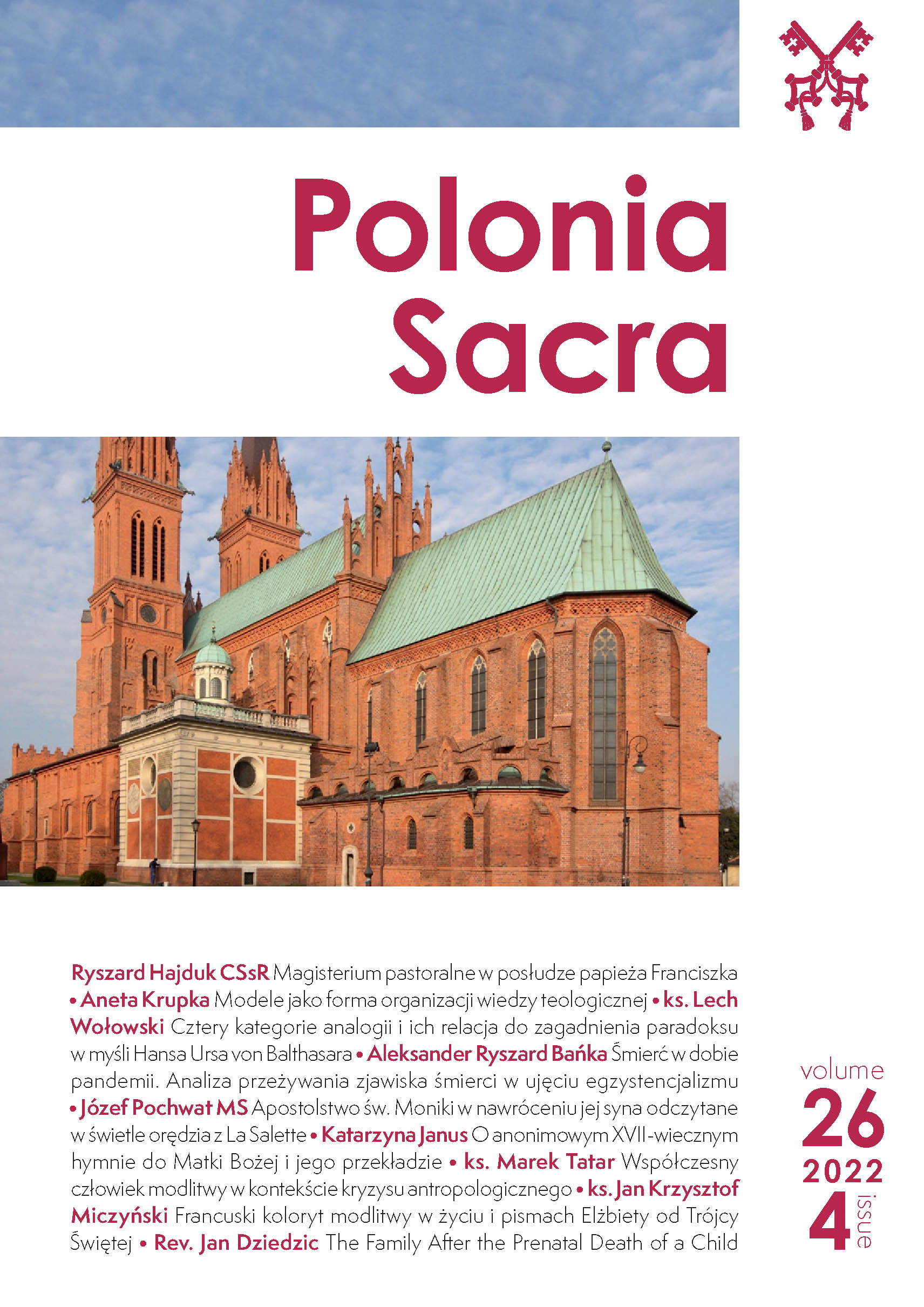Modele jako forma organizacji wiedzy teologicznej
DOI:
https://doi.org/10.15633/ps.26402Słowa kluczowe:
modele teologiczne, modele trynitarne, modele soteriologiczne, model nupcjalnyAbstrakt
Artykuł podejmuje temat stosowania modeli we współczesnej teologii. Pierwsza część rozważań dotyczy metodologicznych kwestii związanych z organizowaniem wiedzy w formie modeli. Szczególną uwagę zwrócono na podobieństwa i różnice pomiędzy teologią i innymi naukami. Druga część artykułu odnosi te rozważania o ogólniejszym charakterze do konkretnych rodzajów modeli teologicznych. Kolejno: modele trynitarne, modele soteriologiczne oraz model nupcjalny zostały scharakteryzowane z perspektywy metodologicznych wyzwań jakie ze sobą niosą. Przeprowadzona analiza pozwoliła dostrzec zarówno zalety, jak i ograniczenia stosowania tych modeli w teologii, widząc jednak ich potencjał. Ich porównanie dało także wstępną perspektywę odpowiedzi na wyzwania metodologicznej współczesnej teologii – przede wszystkim w aspekcie organizowania i wyrażania wiedzy teologicznej.
Bibliografia
Święty Augustyn, O Trójcy Świętej, tłum. M. Stokowska, Kraków 1996.
Święty Augustyn, O wierze prawdziwej, w: Święty Augustyn, Dialogi i pisma filozoficzne, t. 4, tłum. J. Ptaszyński, Warszawa 1954, s. 80–159.
Balthasar H. U. von, Epilog, tłum. J. Zychowicz, Kraków 2010.
Barbour I. G., Mity, modele, paradygmaty. Studium porównawcze nauk przyrodniczych i religii, tłum. M. Krośniak, Kraków 1984.
Bonawentura, O tajemnicy Trójcy, tłum. M. Olszewski, Kęty 2006.
Dola T., Problem komplementarności współczesnych modeli soteriologicznych, Opole 1994.
Góźdź K., Interpretacja dogmatów, „Studia Theologica Varsaviensia” 1 (2018), s. 13–28.
Heller M., Sens życia i sens wszechświata. Studia z teologii współczesnej, Kraków 2014.
Kołata S., Komplementarność modeli w teologii trynitarnej, Kraków 2017.
Krupka A., Tajemnica zaślubin jako model uprawiania teologii w myśli Angela Scoli, Kraków 2020.
Lubac H. de, Medytacje o Kościele, tłum. I. Białkowska-Cichoń, Kraków 1997.
Międzynarodowa Komisja Teologiczna, Interpretacja dogmatów, w: Międzynarodowa Komisja Teologiczna, Od wiary do teologii. Dokumenty Międzynarodowej Komisji Teologicznej 1969–2000, red. J. Królikowski, Kraków 2022, s. 283–313.
Międzynarodowa Komisja Teologiczna, Świadomość, jaką Jezus miał o sobie samym i o swoim posłaniu, w: Międzynarodowa Komisja Teologiczna, Od wiary do teologii. Dokumenty Międzynarodowej Komisji Teologicznej 1969–2000, red. J. Królikowski, Kraków 2022, s. 247–260.
Nossol A., Teologia bliższa życiu. Wpływ teologii na egzystencję chrześcijańską, Opole 1984.
Paluch M., Traktat o zbawieniu, w: Dogmatyka, t. 3, red. E. Adamiak, A. Czaja, J. Majewski, Warszawa 2006.
Scola A., Chi è la Chiesa? Una chiave antropologica e sacramentale per l’ecclesiologia, Brescia 2005.
Scola A., Il mistero nuziale. Una prospettiva di teologia sistematica?, Roma 2003.
Scola A., Il mistero nuziale. Uomo-Donna. Matrimonio-Famiglia, Venezia 2014.
Scola A., Uomo-donna. Il ‘caso serio’ dell’amore, Milano 2002.
Sobór Watykański II, Konstytucja dogmatyczna o Objawieniu Bożym Dei verbum.
Szymik J., W światłach Wcielenia. Chrystologia kultury, Katowice 2004.
Węcławski T., Metodologia teologii, „Poznańskie Studia Teologiczne” 18 (2005), s. 17–24.
Wojtyła K., Miłość i odpowiedzialność, Lublin 2010.
Wojtyła K., Osoba i czyn, w: K. Wojtyła, „Osoba i czyn” oraz inne studia antropologiczne, Lublin 2000, s. 43–345.
Woźniak R. J., Modele z nauk ścisłych we współczesnej teologii trynitarnej. Przyczynek do teo-ontologii relacji, w: Teologia nauki, red. J. Mączka, P. Urbańczyk, Kraków 2015, s. 377–407.
Pobrania
Opublikowane
Numer
Dział
Licencja
Prawa autorskie (c) 2022 Aneta Krupka

Praca jest udostępniana na licencji Creative Commons Attribution-NonCommercial-NoDerivatives 3.0 Unported License.
Autorzy publikujący w czasopiśmie udzielają jego wydawcy zgody o następującej treści:
- Autor zachowuje autorskie prawa majątkowe do utworu, a jednocześnie udziela wydawcy czasopisma zgody na jego pierwszą publikację w wersji drukowanej i wersji online na licencji Creative Commons Uznanie autorstwa 4.0 Międzynarodowe oraz zgody na wykonywanie opracowań, w tym przekładów.
- Autor ma możliwość udzielania zgody niewyłącznej na opublikowanie utworu w wersji, która ukazała się w czasopiśmie (np. zamieszczenia go w repozytorium instytucjonalnym lub opublikowania w książce), wraz z informacją o jego pierwszej publikacji w czasopiśmie.
- Autor może umieścić swój utwór online (np. w repozytorium instytucjonalnym lub na swojej stronie internetowej) jeszcze przed zgłoszeniem utworu do czasopisma.

